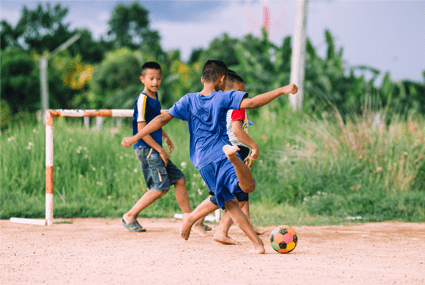
T1D Info
Healthcare Professionals
About Us
Exercise tips
Edited: 22.07.2025

Exercise is important for everyone, it gives us more energy and helps maintain a healthy weight. Exercise is especially important when you have Type 1 Diabetes as it helps to improve the control of your blood glucose and builds up your self-confidence.
All exercise is great – from walking, riding a bicycle to playing football. Try to be a little active everyday.
For a start, set a goal to exercise during 30 minutes everyday. Then gradually increase to 60 minutes a day for 5 to 6 days a week.
Exercise and physical activity can affect blood glucose levels in different ways
It usually lowers blood glucose levels due to:
Muscles using more glucose as energy
Body becoming more sensitive to insulin
Or it can sometimes increase blood glucose levels due to:
The effect of other hormones on the body (usually temporary due to stress or excitement)
Being sick
Test blood glucose before exercise: This helps decide how much food may be required before the exercise starts.
Hypoglycaemia kit: Make sure you always carry a hypoglyacemia kit (e.g. juice and biscuits) when exercising.
Tell the coach or teacher: Make sure you are supervised by someone who can help in case of a hypoglycemia or hyperglycaemia.
Insulin injection: Avoid exercise within 2 hours after insulin injection because it might make the blood glucose level drops much faster. Discuss with your doctor if you are not sure about the insulin injection schedule.
Food to eat before exercise: Ask your doctor or nurse how much food your child may require before exercise. Some suitable choice include: fruit, low fat milk, yogurt, biscuit or a slice of bread.
Prolonged exercise: Prolonged periods of exercise may require extra carbohydrates and/or a reduction in insulin dose. Discuss this with your doctor or nurse.
You have to take control of your own health. It’s important that you tell your teacher whenever you’re not feeling well during exercise.
It’s completely OK to interrupt and stop playing a sport or exercising. You must attend to your diabetes needs, like eating a snack for low blood glucose (hypoglycaemia) symptoms or checking blood glucose levels.
An important thing to remember is that people living with diabetes can sometimes have other conditions that such as neuropathy or heart problems. Engaging in exercise without considering these things can possible cause further problems, or in some cases, serious injury.
For example, a person who has nerve problems in their feet might find running or jogging difficult because of their condition. There’s also the risk of being injured or having sores or wounds on the feet, which can lead to serious complications for diabetics if not addressed immediately.
In the case of heart problems, it would be a good idea to consult a doctor first and ask what types of exercise you can do, and which ones should be avoided. This way, you can tailor fit your exercise routine to include exercises that are safe for your body.
A good tip to remember is to write down any exercises that you will be doing, and take note of the effects that those exercises have on your body. If you feel fatigued or faint after an exercise, it might be a good idea to tone it down to a level that’s more manageable. For people with neuropathy, make sure to check your body for any wounds or sores that might have been caused by your exercise.
Exercise is an important activity that helps strengthen the body and maintain proper bodily functions. For people living with diabetes, exercise is extra important since it helps them manage the complications of their disease better, and can even help regulate their blood sugar levels.
It’s also a good idea to consult a doctor first, especially when engaging in strenuous exercise. This is because people living with diabetes can have certain complications that could deem some forms of exercise unsafe or risky to a person’s health. Despite this, doctors do recommend that people living with diabetes try to stay active in order maintain their health and prevent further health problems.